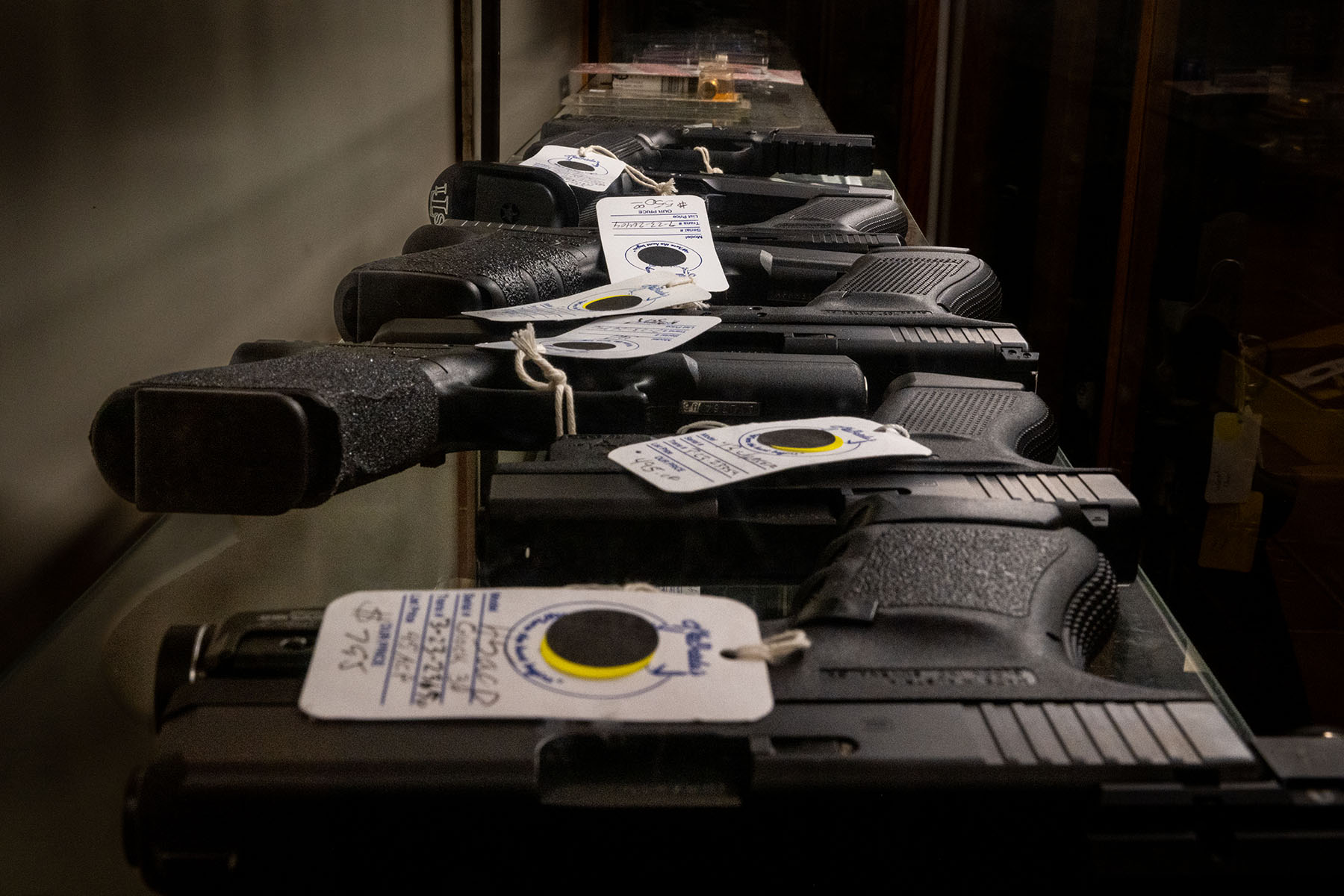The Biden-Harris administration has announced a new rule classifying more people as licensed gun sellers — including those who operate at gun shows and through online storefronts — and requiring them to run background checks before the completion of a sale. The move would set up the largest and most significant expansion of the background check requirement for gun purchases since the passage of the Brady Bill in 1993. It is one of several actions that the White House is undertaking to think holistically about combating the gun violence epidemic — and the way it intersects with gender-based violence.
The new rule, passed through the Department of Justice, closes what is known as the “gun show loophole,” in which people who know they cannot pass a background check often turn to unlicensed sellers in order to evade the background check system. It follows requirements laid out in the 2022 Bipartisan Safer Communities Act’s expansion of firearm background checks.
The new rule is expected to have a significant impact on those who experience domestic violence and other forms of gender-based violence specifically.
“The presence of a gun in a domestic violence situation increases the chance that the victim will die by 500 percent. And we know that background checks are one of the best tools we have to keep guns out of the hands of abusers,” Rob Wilcox, deputy director of the White House’s Office of Gun Violence Prevention, told The 19th following the White House’s announcement Friday.
Wilcox said that background checks have stopped a quarter million domestic abusers from trying to buy guns at licensed gun stores. But that also means they look to other ways to get firearms.
“Too often, we’ve seen abusers circumvent that system by finding a stranger online or at a gun show and completing a sale where there is no background check,” he said. “Nothing to stop them, nothing to flag that they are prohibited because of dangerous domestic abuse.”
Research conducted by Everytown Research & Policy, a nonpartisan gun safety organization, found that one in nine individuals who try to buy guns from private sellers would fail a background check. The same study found that there are 1.2 million online ads per year promoting gun sales that would not require background checks.
Over half of the trafficked guns that the Bureau of Alcohol, Tobacco and Firearms (ATF) investigated from 2017 to 2021 flowed through the unlicensed gun dealer loophole. White House officials estimate that approximately 22 percent of American gun owners acquired their most recent firearm without having first undergone a background check.
“This is going to cover individuals who are selling guns online, in gun shows, where [domestic violence abusers] are going,” Wilcox said. “This is going to cover over 20,000 individuals who are currently selling guns to the public and require them to become licensed gun dealers and do background checks. And those background checks will stop abusers from getting guns intended to harm.”
As the White House makes moves to keep guns out of the hands of abusers and others who are restricted from legally buying guns, officials and advocates are also awaiting a Supreme Court decision in United States v. Rahimi, a case that will likely determine the constitutionality of a 1994 federal law that bars those with standing domestic violence restraining orders from owning and possessing firearms. An estimated 70 women a month are shot and killed by an intimate partner in the United States, and 80 percent of all victims of intimate partner firearm homicides in America are women.
One million American women say they have been shot at by an intimate partner in their lifetime, and Indigenous and Alaska Native, Black, and Latina women are victims of intimate partner firearm homicide at the highest rates, according to an Everytown Research & Policy analysis of the Centers for Disease Control and Prevention’s National Violent Death Reporting data. Indigenous and Alaska Native women are four times more likely than a White woman to be fatally shot by an intimate partner, and Black women are three times more likely. More than four in 10 Latina homicides are committed by an intimate partner, and a firearm is used in nearly 60 percent of these deaths.
In a press call about the new rule, Vice President Kamala Harris — the head of the White House’s Office of Gun Violence Prevention — stressed the move as critical for the public health and safety of Americans.
“Every person in our nation has a right to live free from the horror of gun violence. I believe that. And yet today, one in five Americans has a family member who was killed by gun violence,” Harris said. She also emphasized that gun violence is the leading cause of death for children in America. “And you know, it just does not have to be this way.”
The vice president emphasized that for too long, American lives have been caught between Second Amendment protections and gun safety measures.
“It’s a false choice to suggest that you’re either in favor of the Second Amendment or you want to take everyone’s guns away. I’m in favor of the Second Amendment, and I am in favor of reasonable gun safety laws,” she said.
Wilcox stressed that this new rule from the Biden administration would help to reduce many areas of American life impacted by gun violence — including domestic abuse. “It is certainly going to create a barrier for domestic abusers acquiring guns, which can protect survivors.”
The impacts go beyond that, though.
Access to a gun not only makes it five times more likely that an abusive partner will kill a woman victim, but the connection between intimate partner-related gun violence and mass shootings is well established. Two-thirds of all children and teens killed in mass shootings die in an incident connected with domestic violence. In a study looking at mass shootings between 2014 and 2019, nearly 60 percent were somehow related to domestic violence — and 68 percent of mass shootings involved the perpetrator either killing at least one partner or family member or having a history of domestic violence.
“We know that half of all mass shootings have a connection to domestic violence. And so a check like this can not only protect the person who has been abused, but the public at large from mass, public shootings,” Wilcox said.
He pointed to work the administration has done “upstream” to cut down on the source of illegal guns, including enforcing its new gun trafficking law, restricting the sales of ghost guns and the sales of ready-made parts for the assembly of guns at home without the need for background checks first, and now focusing directly on where gun traffickers acquire guns: online gun dealers, straw purchasers, and unlicensed dealers selling guns at gun shows and online.
Continued Wilcox, “At the end of the day, this administration is pulling all the levels we can to stop the flow of illegal guns — and we know that pays dividends when it comes to ending gender-based violence and when it comes to ending gun violence more generally.”








